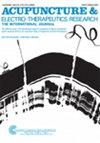Use of Acupoint Stimulation to Regulate Perioperative Stress-Induced Immunosuppression
IF 0.4
4区 医学
Q4 INTEGRATIVE & COMPLEMENTARY MEDICINE
Acupuncture & Electro-Therapeutics Research
Pub Date : 2020-01-21
DOI:10.3727/036012920x15779969212946
引用次数: 0
Abstract
The stress response can be triggered during the perioperative period by tension, fear, anesthesia, surgical trauma, and various postoperative adverse stimuli, leading to significant changes in the endocrine, metabolic, and immune systems of patients. In particular, immunosuppression induced by the stress response has adverse effects on the postoperative recovery of patients. As acupuncture stimulation-related technologies have been rapidly developed and applied in recent years, a number of basic and clinical studies have confirmed that acupoint stimulation can regulate the immune system via local, neurological, and endocrine pathways. Moreover, acupoint stimulation treatment has also been shown to reduce the adverse effects of immunosuppression by affecting the release of various cytokines, such as interleukin (IL) 1, IL-2, IL-4, IL-6, IL-10, IFN-γ, and tumor necrosis factor (TNF) β, immunoglobulins, complement proteins, and T cell markers such as CD3, CD4, and CD4/CD8 via the regulation of macrophages, neutrophils, NK cells, and endogenous opioids. In addition, acupuncture stimulation treatment during the perioperative period can also significantly decrease the amount of anesthetic required for anesthesia, effectively reduce nausea and vomiting, relieve post-operative pain, and accelerate the recovery of physiological functions. Therefore, acupuncture stimulation treatment has shown important potential for clinical applications.穴位刺激对围手术期应激性免疫抑制的调节作用
围手术期紧张、恐惧、麻醉、手术创伤及术后各种不良刺激均可触发应激反应,导致患者内分泌、代谢、免疫系统发生显著变化。特别是应激反应引起的免疫抑制对患者术后恢复有不利影响。近年来,随着针灸刺激相关技术的迅速发展和应用,大量的基础和临床研究证实,穴位刺激可以通过局部、神经和内分泌途径调节免疫系统。此外,穴位刺激治疗也被证明可以通过调节巨噬细胞、中性粒细胞、NK细胞和内源性阿片来影响各种细胞因子的释放,如白细胞介素(IL) 1、IL-2、IL-4、IL-6、IL-10、IFN-γ和肿瘤坏死因子(TNF) β、免疫球蛋白、补体蛋白和T细胞标志物CD3、CD4和CD4/CD8,从而减少免疫抑制的不良影响。此外,围手术期针刺刺激治疗还可显著减少麻醉所需的麻药量,有效减轻恶心呕吐,缓解术后疼痛,加速生理功能恢复。因此,针刺刺激治疗在临床应用中显示出重要的潜力。
本文章由计算机程序翻译,如有差异,请以英文原文为准。
求助全文
约1分钟内获得全文
求助全文
来源期刊

Acupuncture & Electro-Therapeutics Research
医学-全科医学与补充医学
CiteScore
0.50
自引率
66.70%
发文量
9
审稿时长
>12 weeks
期刊介绍:
The aim of the journal is to provide an international forum for the exchange of ideas and promotion of basic and clinical research in acupuncture, electro-therapeutics, and related fields. The journal was established in order to make acupuncture and electro-therapeutics a universally acceptable branch of medicine through multidisciplinary research based on scientific disciplines. The final goal is to provide a better understanding of both the beneficial and adverse effects of these treatments in order to supplement or improve existing methods of diagnosis, prognosis, treatment, and prevention of diseases in both Western and Oriental medicine.
 求助内容:
求助内容: 应助结果提醒方式:
应助结果提醒方式:


